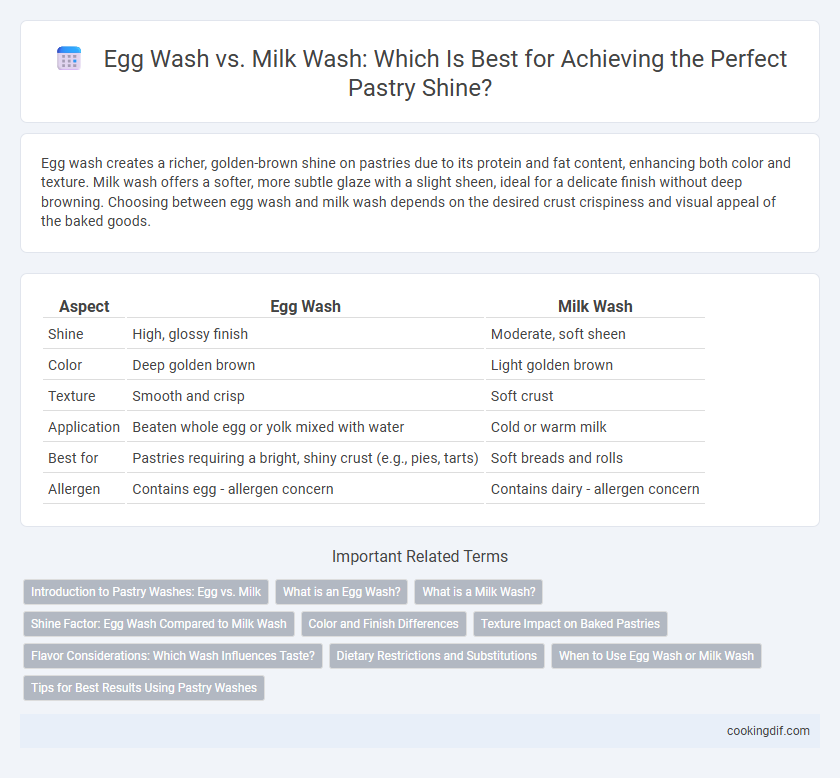Egg wash creates a richer, golden-brown shine on pastries due to its protein and fat content, enhancing both color and texture. Milk wash offers a softer, more subtle glaze with a slight sheen, ideal for a delicate finish without deep browning. Choosing between egg wash and milk wash depends on the desired crust crispiness and visual appeal of the baked goods.
Table of Comparison
| Aspect | Egg Wash | Milk Wash |
|---|---|---|
| Shine | High, glossy finish | Moderate, soft sheen |
| Color | Deep golden brown | Light golden brown |
| Texture | Smooth and crisp | Soft crust |
| Application | Beaten whole egg or yolk mixed with water | Cold or warm milk |
| Best for | Pastries requiring a bright, shiny crust (e.g., pies, tarts) | Soft breads and rolls |
| Allergen | Contains egg - allergen concern | Contains dairy - allergen concern |
Introduction to Pastry Washes: Egg vs. Milk
Egg wash, composed of beaten eggs or egg yolks mixed with water or milk, provides a rich, golden-brown shine and crisp texture to pastries, enhancing visual appeal and crust quality. Milk wash, made from whole milk or cream, offers a softer, matte finish with subtle browning, ideal for delicate pastries requiring a tender crust. Choosing between egg wash and milk wash depends on the desired color intensity and crust texture for the specific pastry being prepared.
What is an Egg Wash?
Egg wash is a mixture of beaten eggs, often combined with water or milk, applied to pastries before baking to create a glossy, golden-brown finish. The protein and fat content in egg wash enhances browning and provides a crisp texture, making it ideal for breads, pies, and puff pastries. Unlike milk wash, egg wash delivers a more vibrant shine and color, improving both appearance and appeal of baked goods.
What is a Milk Wash?
A milk wash is a pastry technique where milk is brushed onto dough before baking to create a soft, golden brown crust with a subtle shine. Unlike an egg wash, which provides a glossy and more pronounced sheen, milk wash enhances color and adds a slight sweetness without making the surface overly shiny. Milk's natural sugars caramelize during baking, contributing to a tender, appetizing finish on breads, pastries, and pie crusts.
Shine Factor: Egg Wash Compared to Milk Wash
Egg wash creates a superior shine on pastry surfaces due to its protein and fat content, which caramelizes and browns more effectively during baking. Milk wash produces a softer, more matte finish, offering less gloss and a subtle golden hue. For enhanced visual appeal and crisp texture, egg wash remains the preferred choice among professional bakers.
Color and Finish Differences
Egg wash provides a rich, golden-brown color and a glossy, smooth finish due to its protein and fat content, enhancing the overall appearance of pastries. Milk wash yields a softer, more matte finish with a lighter, creamy hue, contributing to a tender crust rather than a shiny surface. The choice between egg wash and milk wash primarily affects the visual appeal and texture of baked goods, with egg wash favored for vibrant, glossy pastries and milk wash preferred for subtle, softer crusts.
Texture Impact on Baked Pastries
Egg wash creates a glossy, deep golden-brown finish on pastries due to its protein and fat content, resulting in a crispier texture and enhanced visual appeal. Milk wash produces a softer sheen with a tender crust, as the lactose sugars caramelize gently without toughening the surface. Selecting egg wash or milk wash significantly influences the final texture and appearance, with egg wash preferred for sturdier, crunchier pastries and milk wash ideal for delicate, soft crusts.
Flavor Considerations: Which Wash Influences Taste?
Egg wash imparts a rich, savory flavor and enhances browning with its protein and fat content, making pastries taste heartier and more complex. Milk wash offers a subtle sweetness and tender crumb texture due to its lactose and fat composition, subtly influencing flavor without overpowering the pastry. Choosing between egg and milk wash depends on the desired flavor profile, with egg adding depth and milk providing mild, creamy undertones.
Dietary Restrictions and Substitutions
Egg wash provides a rich, glossy finish ideal for traditional pastries but may not suit those with egg allergies or vegan diets. Milk wash offers a softer shine with a milder flavor and can be replaced with plant-based milks like almond or oat for lactose intolerance or vegan preferences. Alternatives such as aquafaba or melted coconut oil create similar gloss while accommodating dietary restrictions, ensuring a visually appealing pastry without compromising on dietary needs.
When to Use Egg Wash or Milk Wash
Egg wash, composed of beaten eggs and sometimes water or milk, is ideal for pastries requiring a rich, glossy finish and a deep golden-brown color, such as croissants and brioche. Milk wash offers a subtler sheen and softer browning, making it suitable for softer breads, rolls, and pastries where a delicate appearance is preferred. Pastry chefs choose egg wash for durability and shine on crusty items, while milk wash suits tender textures and lighter color development.
Tips for Best Results Using Pastry Washes
For the best shine on pastries, use egg wash made by beating whole eggs or egg yolks with a tablespoon of water or milk, which creates a rich, golden, and glossy finish. Milk wash produces a softer, less intense shine and helps achieve a tender crust without overpowering color. Apply washes evenly with a pastry brush before baking, avoiding overapplication to prevent sogginess and ensuring optimal browning and texture.
Egg wash vs Milk wash for shine Infographic

 cookingdif.com
cookingdif.com